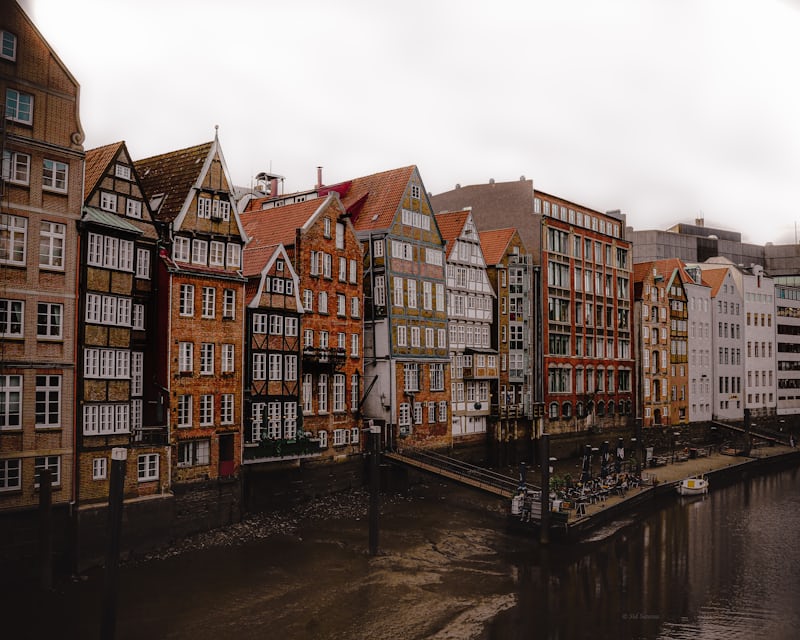Published on | Last updated on
Buying a property is usually one of the biggest decisions in life for you as an adult. After all, you are committing yourself to real estate financing and entering into a commitment to the banks for many years. Read this post to learn about the overview of German real estate financing models and how to take out mortgages in Germany for foreigners.
House buyers or private home builders often take out a mortgage in Germany. You can take out a loan as a private person to finance the purchase or construction of your property.
Find out here how to take out a real estate mortgage in Germany as a foreigner.
Disclaimer: This page may include affiliate links. They do not cost you anything but I might earn a small income if you decide to use one of my recommended partners. Thank you for your support to help keep this platform growing!
1. FAQs about getting real estate financing in Germany as a Foreigner
1.1) What is real estate financing in Germany (Immobilienfinanzierung)?
With real estate financing in Germany, you can take out a loan for a specific purpose – generally to buy a house or an apartment or a land to build a house, or any real estate, renovate an existing property or build a new house.
As an umbrella term, real estate financing includes various forms of loans that can be used as
- construction financing (Baufinanzierung)
- renovation loans (Modernisierungskredit)
- follow-up financing (Anschlussfinanzierung)
1.2) Can foreigners get a mortgage in Germany?
In theory, yes!
Expats can take out a loan in Germany as foreigners to finance their property purchase. However, there are some limitations for foreigners living in Germany with a temporary resident permit.
Non-German citizens are considered riskier investments by local lenders.
This is why foreign citizens are usually required to pay a larger deposit upfront, especially if they do not have a permanent residency or unrestricted employment contact in Germany.
In a usual scenario, German citizens can typically borrow up to 80% of the property value. On the other hand, non-residents can only take out a mortgage for 55–60% of the property value – which means a bigger initial downpayment.
Calculate your mortgage affordability using this German Mortgage Calculator
1.3) How long does a mortgage last in Germany?
Mortgages in Germany usually last 25 to 30 years, with a fixed interest rate for the first few years.
1.4) How much deposit (downpayment) do I need to buy a house in Germany?
You can expect to put down a significant upfront deposit when you take out a loan for real estate in Germany.
The typical deposit for a mortgage in Germany is 20% of the property’s value. Non-EU expats in Germany are often asked for deposits of 30-40%.
1.5) What is loan repayment (Tilgung)?
Loan repayment is the monthly instalment is the amount you pay back to the lender each month. In the German mortgage system, loan repayment consists of interest and the repayment amount.
1.6) What is a fixed interest rate (Sollzinsbindung)?
The fixed interest rate is the period during which the interest rate of your loan is fixed and cannot be changed. You can choose the duration of the fixed interest rate – also called the fixed interest period. Five, ten, 15 or 20 years are common in Germany.
If the interest rates are currently low, you could choose a long fixed interest rate. If the interest rate level is high and you expect interest rates to fall, you should choose a shorter fixed-interest period. As soon as the fixed interest rate expires, the interest rate will be adjusted to the current market.
1.7) What is early loan repayment fee (Vorfälligkeitsentschädigung)
If you terminate your contract by paying off your loan before the end of the fixed-interest period, your credit institute will demand an early repayment penalty (Vorfälligkeitsentschädigung).
This could happen in cases when you secure a large amount of funds after some years e.g. from inheritance or a real estate or a business sale.
Vorfälligkeitsentschädigung is the financial compensation for the originally agreed-upon interest rate that they lose with the early contract termination. The amount of the early repayment penalty is calculated according to how long your contract would still run and the amount of the lost interest payments.
1.8) How can you avoid an early loan repayment penalty?
If you want to avoid this penalty, you can contractually agree with your lender on a clause that allows you for early repayment. Alternatively, you can choose a shorter ending period.
German law (§ 489 para. 1 no. 2 BGB.) also allows you to terminate a real estate financing contract after ten years without any penalty provided you give a six months notice period.
1.9) What is unscheduled repayment (Sondertilgung)?
If you decide to finance a property, you can also make an additional lump sum payment every year to pay off your loan faster. This is called Sondertilgung.
You and your lending bank have to agree upon this annual amount in advance.
1.10) What is residual debt (Restschuld)?
With some real estate financing options such as an annuity loan – a residual debt remains at the end of the loan term. This is called Restschuld. You have to pay off this amount after the agreed fixed interest rate has expired.
2) Eligibility to get a mortgage in Germany as a foreigner
Expats are considered a higher risk group for German lenders. Only a few banks are willing to approve a mortgage for foreigners in Germany. Even when they get approved, they have to pay a larger downpayment.
However, a permanent German residence permit can highly improve your chances of getting approved for a mortgage in Germany as a foreigner.
2.1) German mortgages for employed foreigners
If you are a Non-EU citizen in Germany with a temporary residence permit, you may still be eligible for a mortgage in Germany as long as they meet the following criteria:
- You have been employed by a German company for at least three months.
- You are out of your probation period.
- You ideally have an unlimited employment contract.
- You earn an above-average monthly income – generally higher than your local cost of living.
2.2) German mortgages for self-employed foreigners
Self-employed foreigners in Germany may find it far more difficult to get approved for a mortgage, as most banks generally consider entrepreneurs as risk groups.
- You will need to prove that you earn a steady monthly revenue.
- You can consistently pay monthly instalments.
- The longer your self-employment, the better your chances to get approval.
Use this affordability calculator to find out your potential amount of real estate mortgage in Germany as a foreigner
3) Documents required for real estate mortgage in Germany
In order to make a successful real estate financing application, you must meet prepare certain documents.
3.1) Financial details of the applicant
Banks need to determine whether you are able to afford your monthly instalments.
For this reason, they will check your creditworthiness and borrowing capacity through your financial situation.
You may have to prepare the following financial documents.
- Proof of salary (Salary slips for the last three months)
- Proof of equity capital
- Proof of current loans
- SCHUFA self-assessment
As a rule of thumb, your monthly income must be able to cover your monthly instalments.
The financial security of the borrower also plays a decisive role in real estate financing. So having an unlimited employment contract with a German company also helps.
3.2) Personal details of the applicant
For your mortgage application, you will also need to prepare some personal details. This usually includes:
- A form of ID, such as a passport (not a driving licence)
- Copy of residence permit
- Registration certificate
- Proof of German pension scheme, such as a social security ID
The age of the borrowers sometimes plays a role in the successful mortgage application.
On paper, there is no maximum age to take out a loan in Germany. Younger applicants with several years of working years left have a better chance of getting real estate financing in Germany, than, say an applicant nearing retirement age.
Mature borrowers should be able to prove that they have enough money to live on in the retirement years.
3.3) Property details
You need all the information about the property you want to buy or construct. The documents relating to your property include:
- Purchase contract or, construction plan (if the loan is for constructing a house)
- Floor plans
- Land register
- Exposé
- Development plan
3.4) Equity capital of the applicant
The more equity you bring in, the better the conditions for your loan.
To finance a property in Germany, you need a good equity ratio. It is recommended to have at least 20 per cent equity capital in real estate financing.
But what counts as equity capital in real estate financing?
Equity capital is defined as all funds that are used directly by you as a homebuyer, flat purchaser or builder to finance real estate. These include:
- Cash
- Savings and bank deposits
- Securities (shares, investment certificates, etc.)
- Bausparguthaben
- Unencumbered building plots
- Paid building materials
4) Types of real estate mortgage in Germany for foreigners
Depending on the form of financing you choose, the interest and the type of repayment also differ.
As a rule of thumb, when interest rates are low, a long fixed-interest period of 15 or even 20 years makes sense. Take advantage of the favourable interest rates to agree on a high repayment. This way you keep costs low and the flat is yours sooner.
Not all real estate financing is the same: depending on the general interest rate level and your financial situation, various forms of loans come into consideration:
4.1) Annuity loan (Annuitätendarlehen)
An annuity loan is the most common form of real estate financing in Germany. You pay a constant instalment every month, consisting of interest and repayment – the so-called annuity.
An annuity is the annual payment amount with which a loan amount including interest is repaid. Over the years, the loan amount decreases over time. Since the monthly instalment remains unchanged, the repayment portion increases accordingly.
4.2) Amortising loan (Tilgungsdarlehen)
With a repayment loan – also called an instalment loan – the monthly repayment rate always remains the same, but not the interest rate. This means that the repayment rate changes over time.
4.3) Interest-only mortgage (Endfälliges Darlehen)
A bullet loan is repayment-free and is only paid off at the end of the term with a one-off payment. It is also known as a “bullet loan”.
In this type of loan, the borrower only pays the loan interest (which can be variable or fixed) during the entire loan term.
This form of financing is particularly recommended if you expect to receive a higher amount of money in the near future with which you can pay off the loan in one big lump sum.
Expats will usually need a large downpayment to secure an interest-only mortgage.
5) Real estate financing in Germany without equity
In real estate financing without equity, the full purchase price of a property is financed through a loan. This type of loan is referred to as full financing.
Financing a property without equity in Germany is only possible under certain conditions and is usually much more expensive. Not only you pay a higher monthly instalment, but also higher interest rates.
There two types of real estate financing without equity in Germany:
100-per cent financing: In 100-per cent financing, only the purchase price of the property is financed by loans. In this case, the buyer bears the additional purchase costs himself.
110-per cent financing or full financing: In the case of full financing, all additional purchase costs must also be covered by the main loan or by a separate personal loan. Accordingly, in this case, the buyer contributes 0 euros of equity.
Additional purchase costs are all costs that are incurred in addition to the purchase price for your property. These include land transfer tax, notary fees, land registry fees and estate agent fees. These costs usually amount to 10 to 15 per cent of the total purchase price.
Click here to calculate the rate for 100% financing using this German Mortgage Calculator
Have you ever taken out a real estate mortgage in Germany as a foreigner? How was your experience? Let us know in the comments below.





